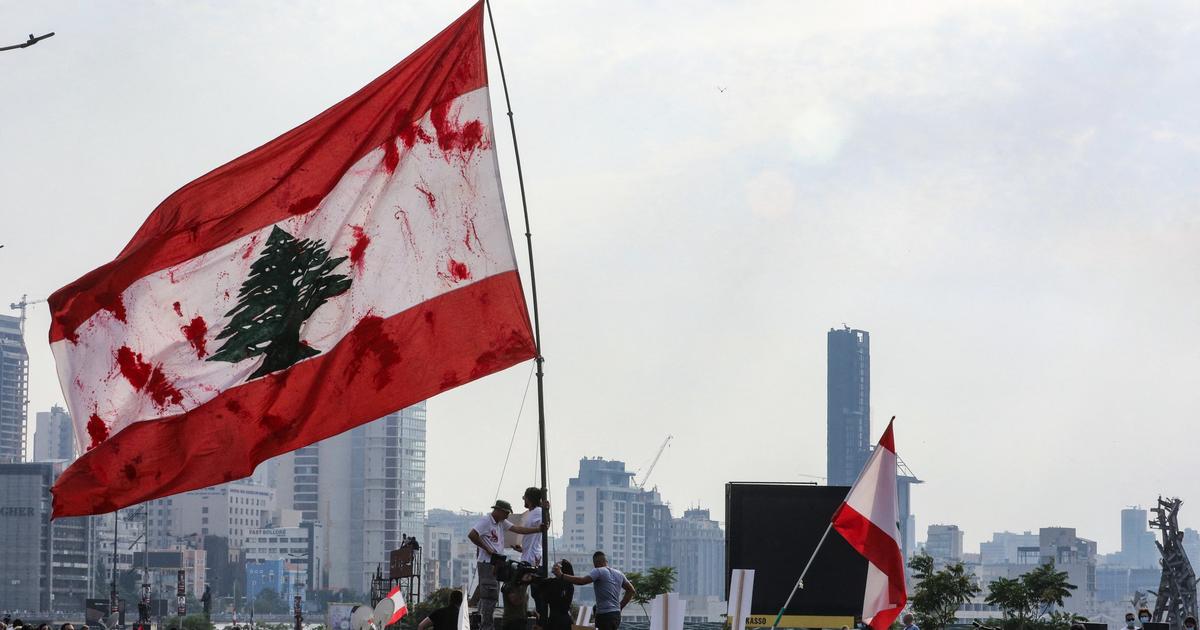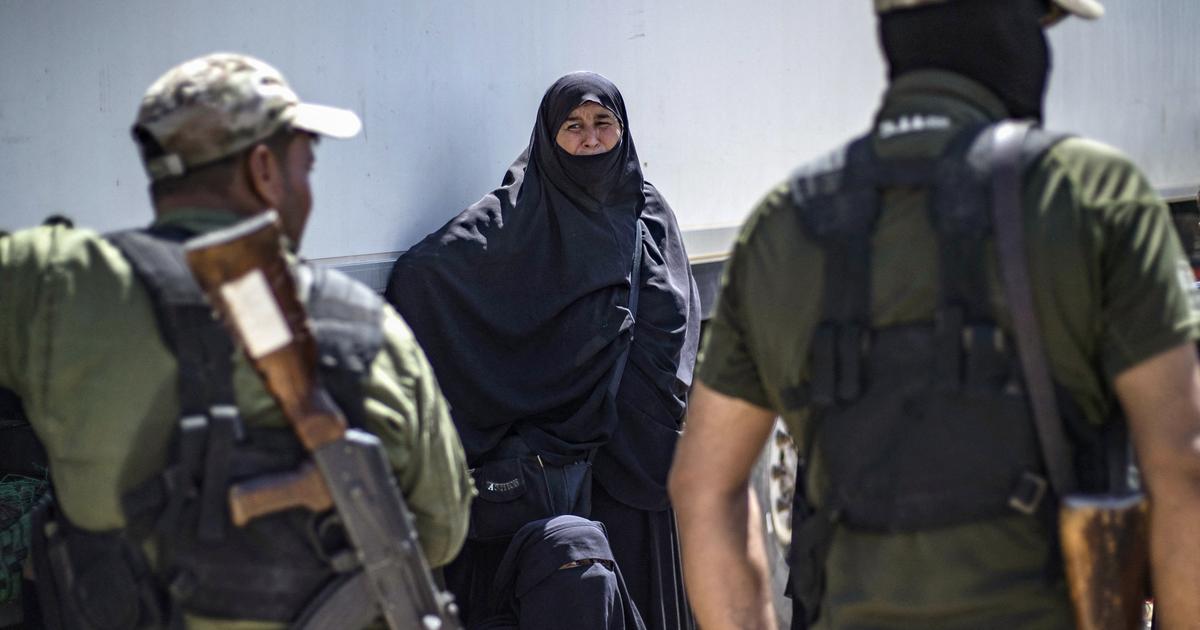When Haya Atassi decided to join pro-democracy demonstrations in the central Syrian city of Homs in March 2011, she never thought her country would end up in bloody conflict.
This woman, who was 18 years old at the time, was moved by the same sentiment that she took young people like her out onto the streets in Tunisia, Egypt, Bahrain, Libya, Yemen.
The need for a change, the need to be able to decide your future.
Ten years later, there is hardly the embers of that Arab Spring and Syria is a country broken by a war that does not end.
More than half of its population has been forced to flee their homes: 6.7 million live as internally displaced persons, more than six and a half million have fled the country - of which 5.6 million are refugees in neighboring countries. .
“Actually, when the revolution started, we thought it would be a matter of a few months.
I never thought it would go on so long, that there would be a war or that there would be such a level of foreign intervention. "
A few months after the protests began, which marks a decade this Monday, Haya Atassi left for Lebanon to study and, shortly after, the rest of her family followed when the young woman's brother, who worked in the Media Luna Roja, was arrested and tortured.
“What I never thought is that the international community would leave us stranded.
I understood how the world worked and I was disappointed, "he says in a telephone conversation.
Years later he settled in Istanbul, where he did a master's degree in International Relations, and currently works for the Syrian Association for the Dignity of Citizens (SACD, for its acronym in English).
He divides his time between Turkey and Lebanon, the two countries that host the most fleeing Syrians.
"In Lebanon, they are not recognized, they are not allowed to work in most jobs and they live in fear that, as is happening, they will be deported back to Syria," says Atassi.
More than half of the refugees who have escaped from Syria live in Turkey: 3.66 million, according to UNHCR data, of which more than half a million are children born in exile.
Compared to other countries in the region, Turkey is the country that has treated them the best, although they continue to depend on a temporary status - they do not receive residence permits, they must remain in the province in which they are registered and only 120,000 have received nationality. Turkish -, explains Omar Kadkoy, Syrian analyst at the Turkish think tank TEPAV: “In terms of accessibility to the labor market, there is some integration, but also a high degree of exploitation.
One million Syrians work in Turkey, most informally, earning less than their Turkish counterparts and, in many cases, less than the minimum wage ”.
This is the case of Salim, an electrician from Aleppo who has lived in the Turkish city of Gaziantep for seven years with his wife and three children.
"I get jobs two, three, at most four days a week," he says by phone.
It is not easy to balance the accounts to make ends meet: he usually earns between 1,100 and 1,200 lira (about 130 euros), that is, a third of the Turkish minimum wage.
The rent takes 650 lira and the electricity, water and gas bills another 300. “It's difficult.
Another problem is that, due to the pandemic, children have not been able to continue their studies because we do not have internet.
"Better here than in Syria, where there is no electricity, no water"
Salim, Syrian refugee in Turkey
Of the 1.2 million Syrians of school age in the country, some 750,000 are enrolled in Turkish schools.
“65% are in school, which is an example for other countries that host refugees.
But the number of those out of school has not changed for four or five years and there is a big problem of young people who drop out of school to work and help their families, ”says Kadkoy.
“With the pandemic, the situation has become very difficult.
Syrian households have more children than Turks, but they do not always have the internet or a computer.
Then you have to decide which child you are going to leave the cell phone to to follow the classes.
And that creates knowledge gaps ”, he adds.
The difficulties due to the health emergency have extended to factories, says the analyst, where three times more Syrians than Turks have been laid off during the pandemic.
But even so, Salim says that he “gives thanks to God” for being in Turkey: “I will go into debt with a relative and we will go away.
Better here than in Syria, where there is no electricity or water ”.
He doesn't think he's coming back anytime soon.
Inability to return
"It is difficult for refugees to return as long as the reason they left, the regime, remains present."
Atassi is categorical on this issue: for her, neither the presidential elections that Bashar al-Assad's government intends to organize in April have legitimacy, nor do the international conferences on return offer any real hope.
The studies that SACD has carried out indicate that part of those who have returned to territory under the control of the regime have been extorted, detained or tortured: “We need a political transition, and that there be a security environment in which the rights of the returnees ”.
“The return to Syria is closely linked to regime change and economic prospects.
So it is highly unlikely that this will happen in the near future ”, agrees Kadkoy:“ Going to Europe is still an option, but not as much as before.
In fact, when [Turkish President Recep Tayyip] Erdogan announced last year that he was opening the doors for them to escape to Europe, Syrians were a minority among the 25,000 who were concentrated on the border with Greece.
This shows that, in the medium and long term, Syrian refugees are going to stay in Turkey ”.
The problem is that the anti-Syrian sentiment is growing.
According to a study by the
German Marshall Fund (GMF)
think tank
, 70% of Turks want Syrians to return to their country, up from around 40% five years ago.
A recent survey by the demographic company Istanbul Ekonomi Arastirma revealed that more than four in ten respondents would feel “uncomfortable” having Syrians as neighbors.
"People think that Erdogan lost that battle against the European Union because he could not send the refugees to Greece, but he was actually playing on two levels," interprets Turkish analyst Özgür Ünlühisarcikli, director of the GMF Ankara office: " The message he was trying to send internally is: 'I understand that there is a problem and I am trying to solve it, but these Europeans behave like barbarians with the refugees and shoot them at the border.'
In this way he managed to alleviate certain tensions in Turkey ”.
Anti-Syrian sentiment
Syrian journalist Yassin Swehat personally knows several Syrians who, in Turkey, have suffered racist attacks: “There have been attacks, especially when Turkish soldiers were killed in Syria.
They told them: 'You are sitting here in the park while our boys die fighting for your country.'
In general, the situation of Syrian refugees in Turkey improves or worsens depending on the internal situation.
When there are elections it always gets worse ”.
Currently there are no elections in sight, but there is a major economic crisis, and in those provinces with a greater presence of refugees (such as those in the southeast of the country or Istanbul itself) they are accused of causing an increase in the price of rents and reduce wages.
According to Ünlühisarcikli, although several mayors and local opposition leaders have launched racist messages against Syrians, the leaders of the political parties have been more cautious and have focused their criticism on the government's management of the issue, and not so much on the Syrians themselves: "The most nationalist party, the MHP, which could have made a more irresponsible use of this issue, is in the ruling coalition, so it has not used Syrians politically."
However, among the new parties whose creation has been announced in the coming months, there is one that could opt for a populist and clearly anti-Syrian vision, according to this analyst.
“Of course, in the long term there will be social and political problems.
There are almost four million Syrians and, in the future, they will demand that their cultural and political rights be respected, in a way that the Government of Turkey may not be willing to accept.
Syrian refugees are now almost 5% of the country's population and the third largest ethnic group, after Turks and Kurds.
But neither should we forget, Ünlühisarcikli stresses, the positive contribution of Syrian refugees to the Turkish economy, as consumers, labor and entrepreneurs (more than 15,000 companies have been founded by Syrians in Turkey).
"And they are of great help to trade with the Arab world, since in Turkey, despite being surrounded by Arab countries, very few people know how to speak Arabic," he says.
Turkey has spent more than $ 40 billion (about € 33.46 billion) on emergency aid and integration programs for refugees.
And the European Union has contributed 6 billion euros, especially to education, health and job training projects.
But the last tranches of this European program were contracted in December and Brussels is still negotiating a new financing mechanism with Turkey and the EU member states.
“You have to start thinking long term and stop being short-sighted,” claims Kadkoy: “Until now, all of Turkey's plans have been for a temporary situation, but that situation has lasted 10 years.
Keeping these temporary solutions for another ten years is not feasible.
The same for the European Union, which must increase its support for Turkey, but not as before, with projects with a horizon of six or 12 months, but taking into account a strategy for years to come.
Syrians are here to stay. "

/cloudfront-eu-central-1.images.arcpublishing.com/prisa/XYUCRUUBQ4JFI5EVYLHDUQGHVQ.jpg)







